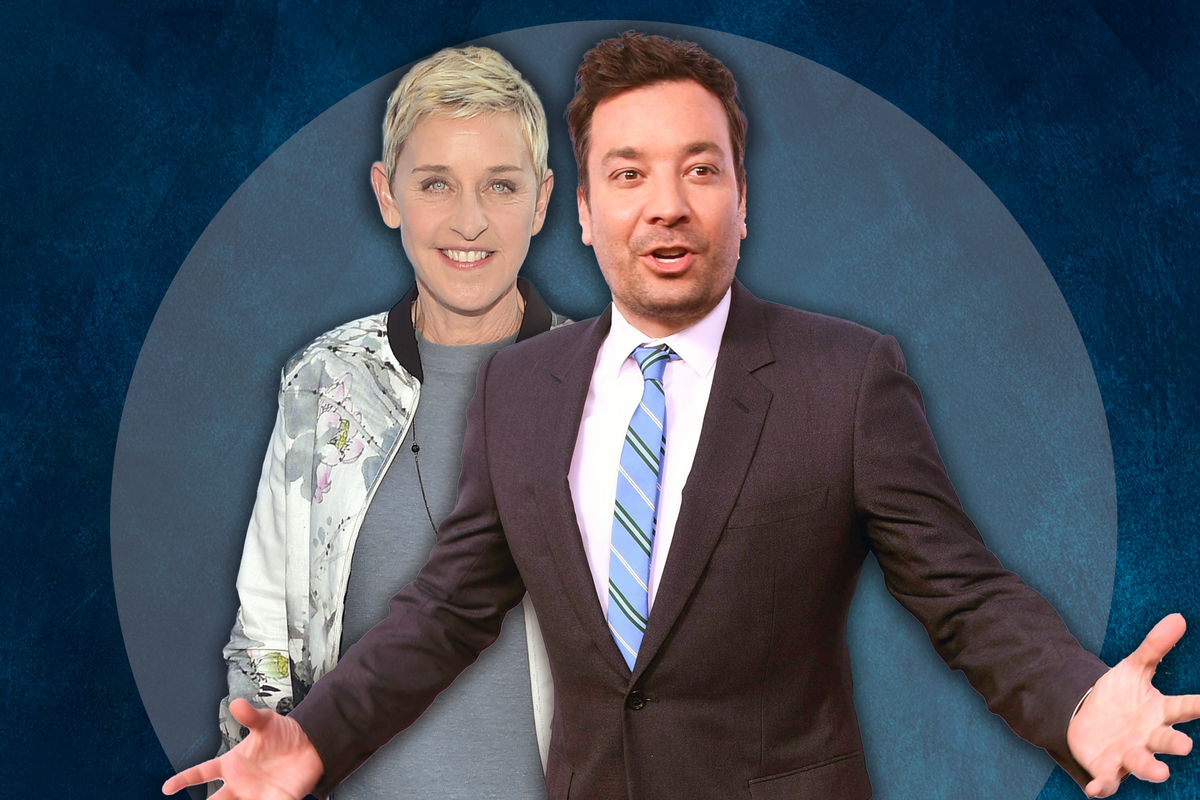From Jimmy Fallon to Ellen DeGeneres, why are talk shows such a hotbed of ‘toxic workplace’ allegations?

- Oops!Something went wrong.Please try again later.
- Oops!Something went wrong.Please try again later.
- Oops!Something went wrong.Please try again later.
- Oops!Something went wrong.Please try again later.
The TV chat show has a tried-and-tested formula, honed to predictable perfection after decades on air. There’s the affable host, who can slip from matey chats with showbiz guests into more topical material with ease. The comfy sofa or the more formal desk favoured by late-night presenters. A bit of audience participation. And some kind of musical interlude (which might be charming or cringe-worthy, depending on your tolerance for, say, watching James Corden emoting in a Land Rover). But now another more troubling ingredient seems to have been thrown into the mix: allegations of a toxic environment behind the scenes that feel at odds with the cheerful quips and skits we see on screen.
Former SNL star Jimmy Fallon’s light touch has made him one of America’s most bankable TV stars. Less avowedly political than some of his fellow presenters (you’re more likely to find him trading musical impressions with Ariana Grande than reeling off searing monologues), he was found by one 2022 survey to have the highest net favourability rating for a late-night host among US adults. But earlier this week, a Rolling Stone exposé gathered complaints made by two current and 14 former employees of The Tonight Show Starring Jimmy Fallon, which has aired on NBC since 2014.
In the investigation, employees claimed that they were left in a “constant state of fear” thanks to a chaotic atmosphere and Fallon’s allegedly unpredictable, “erratic” behaviour. “You never knew which Jimmy we were going to get and when he was going to throw a hissy fit,” one former employee told the magazine, claiming that workers “walked on eggshells” around the host. Fallon reportedly apologised to current Tonight Show staffers over Zoom after the story broke, telling them that he “feel[s] so bad” about the “embarrassing” report; a spokesperson for broadcaster NBC said that they were “proud” of the show and that “providing a respectful working environment is a top priority”. They said that the issues raised by employees “have been investigated and action has been taken where appropriate”.
If the allegations feel depressingly familiar, that’s probably because Fallon’s programme is the latest in a long line of talk shows to be hit with rumours of backstage toxicity in recent years. Back in 2020, former employees of Ellen DeGeneres’s chat show told BuzzFeed News that the atmosphere was “dominated by fear”. One whistleblower alleged that they had been fired after having to take time off for two family funerals, while others claimed they had faced racist microaggressions. DeGeneres herself was not directly blamed, but one employee suggested that she needed to “take more responsibility” on set. The star apologised publicly, and the show was placed under investigation by broadcaster WarnerMedia, but it seemed the damage to The Ellen Show’s brand had been done. The report sat uncomfortably with her “be kind” mantra; ratings dropped, and the show came to an end in 2022, after 19 years on air.
Fallon’s fellow late-night host Corden has also been the subject of criticism, albeit not from his Late Late Show colleagues. Earlier this year, the TV director Craig Duncan described the British actor turned host as “the most difficult and obnoxious presenter I have ever worked with” in a scathing YouTube video recalling an incident filming A League of Their Own (Corden did not respond to the comment at the time). Restaurateur Keith McNally also briefly banned Corden from his venues in 2022, describing him as “the most abusive customer to my Balthazar servers since the restaurant opened 25 years ago” following an incident involving a sub-par (from Corden’s perspective, at least) egg yolk omelette. Corden personally apologised over the phone, McNally later claimed, prompting him to rescind the “ban”, and the host later addressed the allegations on his show, telling viewers that he “made a rude, rude comment” that was “ungracious to the server”.
The negative headlines continued when employees at The Kelly Clarkson Show, a daytime ratings hit that has been hailed as a potential successor to DeGeneres’s show, came forward in May to claim that they had been “overworked” and “underpaid” by producers. An allegedly “toxic” environment, they argued, had a detrimental impact on their mental health (their complaints didn’t relate to Clarkson herself, who was singled out as “fantastic” by staffers). In a statement, a spokesperson for NBC said they are committed to creating “a safe and respectful work environment and take workplace complaints very seriously”, adding that “to insinuate otherwise is untrue”. In a separate response posted on social media, Clarkson said that “to find out that anyone [on the team] is feeling unheard and/or disrespected on the show is unacceptable”. These uncannily similar reports – with their allegations of bullying, mistreatment and overwork – have accumulated to imply a worrying pattern in this particular corner of the industry.
So why do these shows, which might seem pretty innocuous to the outside observer, apparently foster such bad environments when the cameras aren’t rolling? There are a number of potential factors at play. One might be the breakneck schedule on which the writers are expected to operate every day (and night), turning around primetime-worthy jokes and skits on a short time frame. As the news cycle has sped up thanks to social media – which brings us new trending topics on the hour and makes yesterday’s headlines feel distant and stale – surely their jobs have only become more fraught and pressurised.
Jokes are subjective, and the line between what is funny and what’s inappropriate is a blurry one
Just as the potential for burnout is huge, so is the scope for potential exploitation. A job at one of these big-name shows has historically been seen as something of a golden ticket for any aspiring TV writer; many have gone on to forge successful comedy careers or launch their own programmes afterwards. That reputation can be used to shrug off any bad behaviour. Think of Meryl Streep telling Anne Hathaway that a million girls would kill for her editorial assistant gig in The Devil Wears Prada. When staffers are made to feel replaceable, they are less likely to speak out. In Rolling Stone’s report, one former employee claimed they “felt this pressure that if you made one mistake, you were gone and would be easily replaced. You have all these NBC pages in the building who are ready, willing and waiting to take your job”.
Comedy writers’ rooms have long been a place where creatives have been given licence to push boundaries when it comes to humour. But jokes are subjective, and the line between what is funny and what’s inappropriate is a blurry one. An “anything goes” attitude can encourage great punchlines, but it can also be abused. It would be all too easy for those in power to lob insults at their staffers under the guise of banter in an environment like this; again, workers might fear being chastised as humourless if they speak out. Throw in the cult of personality that often exists around presenters and revered producers to the mix and it’s no surprise that the talk show world is rife with allegations of “toxicity” – it’s arguably more surprising that it has taken so long for these claims to surface.

A glance at the changing media landscape presents a pretty grim outlook for the classic chat show. Whereas late-night formats in particular were once ratings juggernauts, easily pulling in millions upon millions of viewers every evening, the streaming revolution has shaken things up. We watch TV in a radically different way to how we did a decade or even five years ago. If they want to find something to entertain us before we drift off, most American viewers have an unfathomable number of hours of programming to choose from, rather than having to tune in to one of a few faintly self-satisfied blokes sitting behind a desk.
Chat shows are expensive to make, thanks to the vast, multimillion salaries commanded by their hosts
Audience figures have declined significantly in recent years – a drop that has gone hand in hand with declining ad revenue: according to ad tracker Vivex, spending on seven major US late-night shows dropped by around 41 per cent between 2018 and 2022. Chat shows are expensive to make, thanks to the vast, multimillion salaries commanded by their hosts. So if revenue drops and those outgoing costs stay the same, you don’t have to be a financial genius to predict the higher-ups are probably panicking. You have to wonder whether many of them are throwing their weight around in a desperate last stab at clawing back relevance.
None of these factors can ever excuse alleged bad behaviour; everyone deserves a work environment that is respectful, and employees shouldn’t have to gaslight themselves into believing that being mistreated is just part of the job. With the lights still off in many chat show studios while the Writers Guild of America is on strike, now’s the perfect time for TV bosses to take a long hard look at themselves. When it comes to work practices, it seems this format needs to adapt or die.

